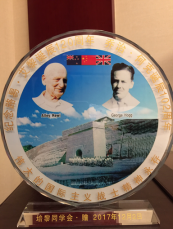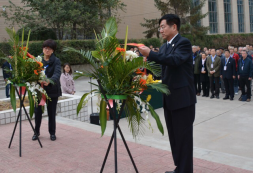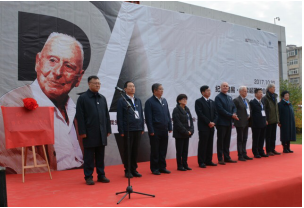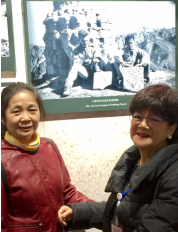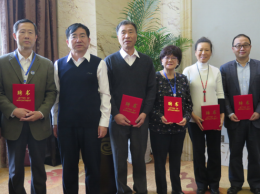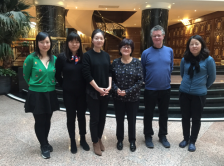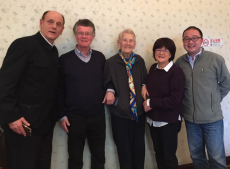Shortly after arriving in Wuhan in 1935 to teach English at the university there, Julian Bell, the nephew of Virginia Woolf and son of Vanessa Bell, wrote to his mother about a Chinese literary and artistic coterie which reminded him of home: “ … the Chinese Bloomsbury in Peiping (Beijing) that’s very much like the London one indeed, so far as I can make out.” (Laurence, Julian Bell, p.20).
Julian was actually reporting second-hand, as he was reflecting on the comment made by his literary confidante and lover, Ling Shuhua, the wife of the dean of the Faculty of Letters, Chen Yuan. Ling was an artist and writer, aspiring to be translated into English and published in the English literary world. Chen had been to England to study at Edinburgh University and LSE in the 1920s. He was also a leading member of a pioneering literary group in Beijing, the Crescent Moon Society and editor of the literary section of an avant-garde magazine, Contemporary Review.
More is known worldwide about the English Bloomsbury Group into which Julian Bell was born (1908) and grew up. He was always surrounded by his family’s intellectual friends and relatives, including the artists, writers and poets Roger Fry, David Garnett, Duncan Grant, Lytton Strachey and Goldworthy Lowes Dickinson (author of Letters from John Chinaman). He also spent his holidays in the Bells’ country house, Charleston, in Sussex, where he enjoyed the rural garden with the Bell and Woolf family entourage of friends. He went to the Quaker Owens School in Islington, north London while living in Regent Square and then Gordon Square. His main memory of his experience there was being bullied and then learning to defend himself. This toughening-up process continued at his secondary school, Leighton Park, which he described as “pretty much my idea of Fascism”. (Laurence, Julian Bell, p.9).
After a gap year in Paris, in 1926 Julian went up to King’s College, Cambridge, where he studied English literature. He did not excel in his studies, but made full use of his connections with writers and academics close to the Bloomsbury Group, such as EM Forster and Eddie Playfair, an old Etonian and his closest university friend whom he owed a great deal for his efforts “to civilise me and give me whatever social graces I possess.” (Laurence, Julian Bell, p. 11). It is ironical that Julian was trying to distance himself from the privileged world of the Bloomsbury intellectual elite during this period in his life, while he was trying to assert his own independent outlook on life. His relationship with Anthony Blunt, later to become the Communist spy for the Russians and art expert responsible for the Queen’s art collection, was a case in point.
Julian published three collections of poetry: ‘Chaffinches’ while at Cambridge (1929) and Winter Movement and other Poems (1930) during his sojourn in France and Work for Winter (1936) while in China. He expressed his love of nature while also reflecting his cruel streak as a hunting man. According to Patricia Laurence he rejected Romanticism as well as the ‘modernist aesthetic and Georgian ‘emotionalism’ associated with the style of the Bloomsbury writers. (Laurence, Julian Bell, pp.31-32).
When Julian graduated with moderate academic qualifications, he failed to win a fellowship for postgraduate studies. At a crucial time in world affairs, with Fascism growing and his own life in limbo, he criticised Bloomsbury’s “mysticism, fantasies, escapes into the inner life”, and, aged 27, made a major life-changing decision: to go to China to teach. At that time the Japanese army was threatening to occupy the north and coastal regions of China from their north-eastern base in Manchuria, and many academic institutions and the academics themselves moved southwards and inland to escape the turmoil. Now an English intellectual ‘escaped’ from the “peaceful qualitative land of tastes and colours” (Charles Mauron quoted in Laurence, Julian Bell, p. 18) to China as a left-wing man of action who had a certain fascination for the battle-field, which would turn out to be fatal.
Three months after his arrival in Wuhan University, Julian Bell found an answer to his question in a letter to his mother: “Shall I ever find a Chinese mistress”? In another letter to Marie Mauron in France he wrote:
“Really, I am falling a bit in love with China – also platonically…with a Chinese woman”. (Laurence, Julian Bell, p. 19). This platonic relationship soon burgeoned into a fully-fledged romantic affair.
Romantic love and the emancipation of women had been the hallmarks of China’s early cultural revolution, the May Fourth Movement, which had spread from the patriotic demonstrations after the perceived betrayal of China at the Versailles Treaty at the end of WW1. An earlier magazine, New Youth, started by prominent progressive writers, had paved the way for new writing in vernacular prose and poetry on themes which criticised the classical and feudal traditions, including Confucianism. Condemning hierarchy and paternalism, these liberal thinkers, such as Lu Xun, Hu Shi, Guo Moruo, Lao She and Mao Dun, studied and translated modern Western political philosophy and literature and many went abroad to study.
Chen Yuan, Dean at Wuhan University, and Xu Zhimo, who had studied at Cambridge University in the 1920s, were among these, and they invited such prominent intellectuals as Bertrand Russell, Rabindranath Tagore and John Dewey to visit China to give lectures. These lectures, organised in Beijing by the Society for Lectures on the New Learning made a big impact on the progressive, and especially young, intellectuals, mainly based in the famous universities such as Peking University where patriotic, radical and liberal ideas were flourishing. Chen Yuan, Hu Shi and Xu Zhimo and several other friends also met regularly for discussions over dinner and other recreations, first at Xu Zhimo’s distinguished courtyard home in Beijing. They called this salon The Crescent Moon after Tagore’s book of prose poems titled The Crescent Moon.
Into this elevated circle of literati came Ling Shuhua, who had graduated from Yanjing University in July 1924, mainly as a close friend of Xu Zhimo, who dubbed her ‘the Chinese Katherine Mansfield’. She had already written several short stories and was encouraged to develop a new style of writing, which as “less plot-driven and continued her focus on the psychological lives of women and children.” (A Thousand Miles of Dreams, Sasha Su-Ling Welland, p. 149). Chen Yuan (Chen Xiying), was also a translator of Katherine Mansfield, and they shared an admiration of Tagore, whom Shuhua had heard lecture and spoken to personally.
Shuhua came from a traditional, wealthy family in Beijing, where her father, Ling Fupeng, became a scholar-official and then mayor in the last years of the Manchu Dynasty at the turn of the century. Her mother, Ruolan, was from humble origins, becoming the fourth wife of her husband’s six wives or concubines. Shuhua wrote about her family’s past in her autobiography My Mother’s Marriage and A Happy Event, which were two chapters in what became her collection of fictionalised stories published in English in England as Ancient Melodies in 1953. (The Hogarth Press).
Shuhua and her sister Shuhao (Amy) offered different accounts of their mother’s background, but her grand-niece, Sasha Welland, tends to support Shuhua’s version of her mother’s trials and tribulations (A Thousand Miles of Dreams, pp. 37-45). Ruolan’s position in her husband’s household was servile and traditional, as depicted in the film Raise the Red Lantern by the director Zhang Yimou. She had to cooperate and compete with her husband’s other wives and concubines to produce offspring – four of his ten children. Their daughter, Shuhua, was the fourth and she and her sister were the only two survivors of an horrific accident in Japan where their father was sent by the Imperial court as Ambassador to inspect the progress of reforms initiated by the Meiji government.
Both Shuhua and her sister, Shuhao, had the good fortune to have had a home tutor, whom their father engaged to teach them the Chinese classics, starting with the Analects of Confucius. This was the basic learning for children growing up in wealthy, mandarin households, where boys were given preference for their future official careers, but where the girls were also provided with enough cultivation to enhance their prospects of a good marriage and make them compatible companions. By the time Li Fupeng was educating his own children, the traditional official exam system had been abolished and Western-style new learning was become institutionalised, but he still had more confidence in the Confucian educational system at this stage.
In 1915, after the fall of the Manchu Dynasty, Ling Fupeng was assigned a task by the Republican President Yuan Shikai to supervise repairs on the Qing imperial tombs in Tianjin. While her sister continued her studies at home, Shuhua’s mother arranged for her to study at Tianjin First Girls’ Normal School. This school, like most others at this time, taught modern subjects during a period of educational reform along Western lines. Both boys and girls studies similar courses, except that whole the boys studied agriculture, the girls took classes in home economics, gardening and sewing. Amy joined Shuhua as a boarder a year later and competed with her in the same class, declaring her superiority: “I didn’t think she was the smartest, but she could paint and write. Her compositions were real good. But I said: You don’t know the other things. I think I’m better at other things.” (Sasha Wellend, A Thousand Miles…, p. 112). Shuhua wrote a short story, ‘Little Liu’, first published in 1929, depicting a girls’ school based on her own experiences.
Shuhua also included a story ‘My Teacher and My Schoolmate’ in Ancient Memories, which reflected the student patriotic protests and the ‘Down with Confucius’ campaign, rejecting the Chinese classical tradition and old educational system. Shuhua herself was a leading activist in the school’s patriotic campaign, which was consolidated into the Tianjin Association of Patriotic Female Comrades. Her teacher selected the best essay of his pupils to be printed in Tianjin Daily. He read it out to the whole class and she “realised it was my own article; my face flushed, my heart beat fast, and later tears came into my eyes. I did not dare to look at anyone”. (Sasha Welland, A Thousand Miles…p. 123; Ancient Memories, p.234).
Upon the family’s return to Beijing, Ling Shuhua and her sister, entered the women’s college of the newly-established Yanjing University in Beijing in 1921. This was the prestigious university founded by American missionaries as an integration of four missionary schools, but was not yet consolidated into the campus on the site of the Old Summer Palace in northwest Beijing. Shuhua studied zoology, as she was inspired by Guo Moruo’s translation of The Sorrows of Young Wertherby the German writer Goethe, who had also studied this subject. She was also enrolled in the department of foreign languages and literature. Amy studied English as a basis for her study and future profession of medicine.
In her third year at university Shuhua made contact with the already famous writer, essayist and translator, Zhou Zuoren, who was the younger brother of Lu Xun. He was giving a series of lectures on ‘New Literature’, introducing new Chinese writing in baihua, the vernacular style of writing which was becoming popular amongst the progressive writers and readers during those years. Although she couldn’t enrol in his course, he agreed to mentor her, and in September 1923 she began
to receive his private tuition and advice in writing in the new style. At the beginning of the next year, she published her first baihua story in the Morning Post literary supplement, ‘A Daughter’s lot is too Miserable’.
A Thousand Miles of Dreams, Sasha Wellend, p. 140).
Shuhua wrote another story, Waiting, published in Contemporary Review in April 1926. This story was a direct political reference to the incident which happened in Tianjin a couple of months before when 47 patriotic protestors, mostly students including two women, were killed by warlord police. Shuhua also wrote to the famous radical intellectual and reformer, Hu Shi about this massacre “It makes your stomach burst with anger”. In this letter she also mentioned that her father had agreed to her engagement to Chen Xiying (Chen Yuan) and that this “added another colour to life and gave comfort, sympathy and encouragement, offering a walking stick on the road of art.” (A Thousand Miles of Dreams, Sasha Welland, p. 183). A month later they married in a Beijing courtyard with many mutual friends in the local literary circle attending.
After visiting Xiying’s parents in Wuxi, the couple settled in a flat belonging to Hu Shi, while he was travelling abroad. Xiying continued with his work as editor of Contemporary Review, while Shuhua got a position as Beijing Palace Museum in the department of painting and calligraphy. While Xiying also continued lecturing at Beijing National University, Shuhua volunteered as an assistant teacher in the art department of Yanjing University.
In 1928, after spending a year in Kyoto in Japan, mainly to escape the political unrest in Beijing, Xiying and Shuhua decided to move to Wuhan, where a new university was being established mostly as a refuge from the continuing chaos after the Guomindang (Nationalist) suppression of all suspected Communists and their sympathisers in the north. Chen Xiying became chairman of the foreign languages department at Wuhan National University, and later served as dean of arts. Shuhua taught a few basic English classes, but was barred from any more formal academic post in literature or art, as only those who had studied abroad could enjoy this privilege. In this situation, she began to feel isolated from the other academics and intellectuals, many of whom had also arrived from the Beijing universities.
Even Xiying began to miss the more vibrant life which they were used to in Beijing, writing to Hu Shi in December 1929 of the quiet atmosphere as “a dead water pool”: “I manage to carry on because I have some work and must go to school, where I see a few people. This place for Shuhua though is really like being buried alive. She is suffocating to the point of tears, and I have no way to comfort her.” (A Thousand Miles of Dreams, Sasha Welland, p. 216).
Shuhua expressed her own feelings of solitude in a story, Little Liu, which she wrote that same year: “I was really going crazy with boredom lately. The only time I ever got to escape the house was when I taught English two hours a week; and that was so easy I could switch off my mind and still teach it perfectly”. And the rest of the week? I just sat at home. (A Thousand Miles of Dreams, Sahsha Welland, p. 217). This story, however, was included in a collection of eight of Shuhua’s stories, Women, published by Shanghai Commercial Press in 1930 and reprinted twelve times over the next sixteen years. (ibid. p. 218). Her writing slowed down when she gave birth to their daughter, Xiaoying, probably in the following year.
By mid-1935 Shuhua had published another collection of stories with the same publisher. Entitled Little Brothers it consisted of nine stories about children based on her own childhood memories. Two of these stories ‘Moving House’ and ‘A Happy Event’ later appeared in English in her memoir Ancient Melodies. (ibid. 222).
In early 1935, Shuhua and two other women writers at Wuhan University established a weekly literary supplement to Wuhan Daily, called Contemporary Literature and Art. The main guiding principle of this publication was that it should not take sides in the literary factionalism which had been going on ever since the various new literary societies were formed in the early 1920s. It also proclaimed that the new writing which the journal published should not be involved with the current political trends or divisions, particularly between the Communist Party and (Guomindang) Nationalist Party followers, but should be apolitical. As editor, Shuhua became reactivated and also included her own stories and essays in early issues of the new publication. Her manifesto aimed at putting Wuhan clearly on the map of the new Chinese literary movement, particularly the modernist trend between decadent romanticism and revolutionary utilitarianism. (ibid. p. 242).
Into this revived literary scene and the lives of the Chinese protagonists in Wuhan came a “wayward son from the Western world.” (ibid. p. 243). He was a Bloomsbury boy “with the exuberance of a twenty-seven-year-old primed for adventure”, including exploring new landscapes and new cultural, intellectual and romantic experiences. His enthusiasm on arrival in China was epitomised in his letter to his mother “I see I should lose my head fifty times over with half a chance.” (ibid. p. 243, quoted from Quentin Bell, Julian Bell, Essays, Poems and Letters, p. 34, Hogarth Press, 1938). He also mused: “Shall I ever find a Chinese mistress? Lots of them are attractive but I doubt there’s much doing.” (Laurence, Julian Bell, p. 19).
Julian’s first impressions in Wuhan Univeristy, where he was accommodated in a western-style house on Luojia Mountain, were full of excitement and anticipation, as he wrote to his mother: “Everyone here is charming to me – I’ve spent the afternoon with the dean of the faculty and his wife and daughter – about 6 – a fascinating child who fell for me. It’s all very informal – A Mediterranean Cambridge.” A week later he wrote: “My dean, Prof Cheng [sic]] Yuan and his wife, are my neighbours, and simply angelic…extremely cultured: he a critic and translator of Turgenev…she a painter (Chinese style), writer of short stories and editor of a literary page in one of the big Hankow papers. I gather she’s called the Chinese Katherine Mansfield, but I fancy there’s more to her really, though she’s very quiet and gentle.” (A Thousand Miles…, p. 244-245; Quentin Bell, Julian Bell, p. 42)
Julian Bell was, however, a serious-minded young man, who wanted to do his best to bring his literary background and connections to his teaching of English literature at the university. His first course covered the period 1890-1912, introducing Samuel Butler, Joseph Conrad, Oscar Wilde and A.E. Houseman.
From the beginning, Ling Shuhua attended his courses, including his Shakespeare class. He wrote to his mother that she had “the good effect of making me lecture my best.” (A Thousand Miles, p. 247; Quentin Bell. Julian Bell, pp. 49-50). Three months after arriving in Wuhan, Julian wrote to his friend Marie Mauron in France: “Really, I am falling a bit in love with China – also, platonically (yes, I assure you, for particular reasons, social, and so on) with a Chinese woman.” (Laurence, Julian Bell, p.19). He showed his deeper attraction to her: “She’s sensitive and delicate, intelligent, cultivated, a little malicious, loving those gossipy stories, etc, that are true about everyone, very gay – in short, one of the nicest and most remarkable women I know.” (ibid. p. 20). According to Patricia Laurence, “Julian was delighted with China. He dreaded the teaching, but enjoyed translating Ling Shuhua’s stories with her, learning Chinese (a modest amount), practising calligraphy, shootings, sailing and being guided through the culture, politics, food and art of China by Ling Shuhua.” Soon he admittted to his mother that Shuhua “was the most charming creature I’ve ever met, and the only woman I know who would be a possible daughter in law to you…she really is in our world.” (Laurence, Julian Bell, p. 21). He also confessed to his Cambridge friend, Eddy Playfair: “She’s very shy physically and verbally….it’s my oddest affair to date.” (Ibid, p. 21).
Julian quickly developed close relations with the Chens, both in intellectual and personal terms. Visiting their home in the early days, Shuhua unrolled a scroll brought from England for her with the paintings and verse of both Chinese and English painters and poets, including the Bloomsbury painter, Roger Fry (who became Vanessa’s lover). He admired Shuhua’s copies of Song and Ming masterpieces and his sent his mother a copy of her essay on Chinese landscape painting, asking her to help publish it in England. After inviting the couple to dinner in his house for the first time, he wrote of Shuhua to his mother: “We go on, growing more intimate friends.” (A Thousand Miles, p. 242: Quentin Bell, Julian Bell, p. 26).
One of the ways in which Julian and Shuhua got closer was by cooperating in mutual literary skills. He helped her translating her stories into English and three of them were published in China in the literary magazine T’ien Hsia Monthly, which had published his own poems. He also tried to have these stories published in England through writer David Garnett and his mother. He also sent Vanessa an article by Shuhua on the difference between Western realism and Chinese ink painting. Although Vanessa failed to get these writings published, both women started corresponding on literature and art and Vanessa sent Shuhua one of her watercolours, which Shuhua hung in her living room opposite a lithograph given her by Roger Fry. (A Thousand Miles, pp. 254-255).
Shuhua’s relationship with Julian was complicated and naturally fraught. He wrote to Vanessa: “I’m by now very heavily involved, and shall be desperate if I can’t. She’s definitely the most serious, important, and adult person I have ever been in love with – also the most complicated and serious.” (A Thousand Miles. p. 248. Julian’s mother read his letters aloud at family gatherings and Virginia Woolf even wrote to him in December: “By the way give your lover, if she’s my lover, my love.” (A Thousand Miles, p. 249: Virginia Woolf, The sickle Side of the Moon, The Letters of Virginia Woolf, p. 452).
At the end of the first term, in January 1936, the two lovers found a pretext to get away to Beijing to be together for the holiday. Chen Xiying had left town and Ling Shuhua told her colleagues that she was going to see friends in Beijing. They travelled separately, but when they met Julian revealed all in a letter to to his mother: “I’m enjoying life as I haven’t for years: Peking is one of the great capitals of the world – oddly like Paris, at times. could you imagine anything more perfect than coming to Paris with a mistress who really knows the town, is devoted to me, is perfectly charming, has an impeccable taste in food – it’s the dream of a romantic man-of-the-world…Also, I am meeting Chinese intellectuals and English, going to the theatre, skating…and making love.” (A Thousand Miles, p. 252; Quentin Bell. Julian Bell, p. 75).
Their sojourn in Beijing was certainly an enriching experience for Julian. Shuhua took him to antique shops to buy curios, led him sightseeing outside the city and introduced him to the famous artist Qi Baishi, whom she knew from childhood. Julian bought one of his paintings and the painter give Shuhua two of his small paintings, which he signed for her. In spite of calling Shuhua his ‘secretary-interpreter’, the two had become so emotionally entangled that they even spoke of future marriage and planned to continue their affair back in Wuhan. It is not clear whether both of them were really committed to this course of action, and Julian certainly displayed a degree of cynicism and bravado, which both his biographers, Sasha Welland and Patricia Laurence discern and despise.
Julian’s mother and some of his friends were warning him of the risks he was taking by this amorous pursuit and he dismissed them with some trivial comments: “I must get my incongruous box of tricks together…the thing to do really, I believe, would be to write a biography since that’s what people like nowadays, Shall I…with Sue’s [Shuhua] help, invent a Chinese personage and invent a life of him?” (A Thousand Miles, p. 253); Quentin Bell, Julian Bell, p. 82).
In the second term in Wuhan, Julian taught a course specifically on the Bloomsbury writers which at least he seemed to be enjoying, especially as Shuhua continued to attend the classes. However, he gradually became critical of his students and colleagues for their “primitive sentimental streak”, losing faith in his early image of Wuhan being a ‘Chinese Bloomsbury’. He wrote to his mother, Vanessa: “They’re almost like savages sometimes in the way their intuitions can get debauched…I feel that we’re far better at understanding them than they us.” ( A Thousand Miles, p. 255; Quentin Bell. Julian Bell, pp. 102-104).
This bilious description of Chinese sentimentality, was also reflected in Julian’s attitude to Shuhua’s character and writing in another letter to his mother: “She’s got the unreflecting egotism of most writers, so that she sees every situation in purely personal terms…”. He even refers to his aunt in scathing terms: “Rather like Virginia, perhaps, she makes pictures of people but doesn’t ever get hold of an alien mood or tone – all Virginia’s people live inside her own world.” (A Thousand Miles, p. 256).
As Julian’s affair with Shuhua became more complicated, he himself turned more into his own world and European affairs, paying little attention to the internal strife in China and the growing aggression of the Japanese military. He seemed to be escaping into his manly, physical pursuits by shooting ducks and going for sailing trips on nearby lakes. In June of 1936, Julian went on an expedition upriver to Sichuan and up Mount Emei with his favourite student, Ye Junjian, and an English geologist. While this tour might have satisfied Julian’s thirst for adventure, it shockingly revealed his growing alienation from the country and people he had first encountered with excited fascination: “I have violent fluctuations of feeling about the country, which is often charming to look at, sometimes produces a beautiful human being and more often works of art, but is so squalid, diseased and populous it can give one the creeps, and one feels they are just a pullulation of bacteria.” (A Thousand Miles, p. 257; Quentin Bell. Julian Bell, p. 143).
After another trip to Beijing with the whole Chen family, on returning to Wuhan in October, Julian became more anxious about his relationship with Shuhua being discovered and Chen Yuan questioned her about it. When Chen Yuan finally discovered them together in Julian’s house, the game was up. Even Julian felt sympathetic to Chen Yuan if not apologetic, as he wrote to his mother: “Her husband behaved very reasonably considering what an idiotic position he was put in, and that he was pretty much bouleverse, not having got the full truth till the last moment”. (A Thousand Miles, p. 258; Peter Stansky & William Abrahams, Journey to the Frontier, pp. 290-291).
The ensuing scenario, with Chen Yuan offering the two lovers various choices, turned into a fiasco. Julian reported (to his mother, as usual) that Shuhua had chosen to break up with him and he had decided to resign his post. Shuhua escaped to Beijing, but kept up a complicated, emotional correspondence with Julian behind Chen Yuan’s back. Against Chen Yuan’s wishes, Shuhua returned to Wuhan, fantasising about a future reunion with Julian in England. (A Thousand Miles, p. 260). She soon heard rumours of Julian having another affair with a young English woman studying at the university and, unable to see him, she decided to go back to Beijing, writing to him in a parting letter: “…God know when we could meet again. within a few steps we cannot see each other, it is so cruel!…I believe my going away will be good for everyone here, at least I will not feel I am in somebody’s way later on. ..For whom I am doing this sort of torture? Perhaps all my life [I] will suffer the same thing.” (A Thousand Miles, p. 260).
Even after this parting, the frustrated couple corresponded, planning to meet again somewhere, Shanghai, Hong Kong or England. Julian encouraged these plans and fantasies: “…you’ll come to England, we’ll be happy and peaceful once again.” (ibid, p. 260). While Julian still plotted to deceive him, Dean Chen overcame his hurt pride and organised a farewell reception which he conducted personally and professionally for Julian, who had once called him “A proud – vain – stiff man: a frightening opponent – at least in intelligence and cunning.” (ibid. p. 261).
Chen Yuan seems to have extremely patient and polite with Julian, considering that he had been deceived and betrayed by the Englishman to whom he had given the post at his university. But his patience surely had its limits when Julian apparently advised him to separate from Shuhua, as Chen Yuan indicated in a parting note to Julian: “I really don’t think you know very much about me, for you had the version of me made up by someone to justify herself, and I don’t think you really know her. Of course you won’t admit it. But it explains why your advice will not be acceptable to me.” (ibid, 262).
Shuhua and Julian met secretly one last time when she came to see him off in Hong Kong where they spent a few days together, enjoying the mountains and planning for Shuhua to have her paintings exhibited in China, America and England. After his departure, Chen Yuan learnt of this final betrayal, as he had forbidden them to meet again. Shuhua lied and made excuses, while feeling her husband’s sadness and righteous anger, which she described to Julian, ending “It’s still winter here, and my mind is winter too.” (ibid. p. 262)
Chen Yuan blamed Julian for this final deception when he wrote to Julian the following month, finally expressing all his pent-up anger: “…I thought that whatever might be your moral principles in some matters, an Englishman still had to keep his word and to consider his honour. I did not know that in throwing overboard some moral principles, such as loyalty to one’s friends, you threw away all. No faith, the honour, no word to keep – nothing would prevent you to seek your selfish gratification.” (ibid. p. 262).
This whole affair was reproduced as a sensationalised, erotic novel by the woman writer Hong Ying as K, published in 2001 in Chinese and in England in translation in 2002 as K, The Art of Love. The characters in the novel were easily identified – Shuhua as Lin, Chen Yuan as Cheng but Julian with his original name. As a result, her daughter, Xiaoying, took the author to court in China and won a substantial fine and public apology for defaming her parents. In defense of her novel Xiaoying had claimed that she meant no harm and told the press that her fictionalised character, Lin, is “one of the very few women at the time to shake off the shackles of traditional ideas; she should be considered as a heroine of feminism.” (ibid, p. 264). One difference between fact and fiction is that in the novel, Lin finally commits suicide, while Shuhua turned her sadness into literary strength.
Julian had departed and Shuhua was left to sort out her marriage. In spite of Julian’s appeals to her to divorce Chen Yuan and follow him to England, she gave up this plan. She had neither the means nor the will to leave her husband and she needed to save face and salvage her reputation in China. She continued writing and shortly after the debacle she published a short story titled ‘Xiaoying’, in a Chinese publication called Youth World. In the story he little daughter wrote a note: “Next Sunday we will cross the river to eat out, watch a movie, and go shopping. Why? Because it’s father’s birthday.” (ibid. 265).
As for Julian, he promptly carried out his earlier plan to go to Spain to join the Republicans against Franco’s Nationalists. This fulfilled his ideal of experiencing war and defending a just cause, and he joined the Spanish Military Aid as an ambulance driver. He did not join directly as a Republican fighter, as his mother and friends feared for his life as a reckless, impulsive youth, but his ambulance was bombed near Madrid and he was mortally wounded on July 18, 1937. In hospital, he whispered to a friend, “Well, I always wanted a mistress and a chance to go to war, and now I have both.” (ibid. p. 265; Stansky and Abrahams. Journey to the Frontier, p. 412).
The news of Julian’s death came to Wuhan via Reuters within a week and two hundred students and faculty members at Wuhan University attended a memorial meeting for him. Shuhua shared her grief with Vanessa Bell, and the two continued to correspond, Shuhua sending Vanessa some flower seeds. (ibid, p. 276). Now the war with Japan was intensifying encroaching, with Japanese planes bombing Wuhan in the Autumn of that year. Shuhua joined the Wuhan University Women’s Service League visiting wounded soldiers and wrote an article about this in Tianjin’s National News, which appeared in November. (ibid. p. 275).
Shuhua herself felt despondent, especially when Chen Yuan’s mother and sister came to stay with them after his father was killed in a Japanese bombing raid in Wuxi. She withdrew to reading and found Virginia Woolf’s novel A Room of One’s Own in the university library. This encouraged her to write to Virginia describing the situation in Wuhan and asking for her advise. Virginia’s reply was instrumental in forming Shuhua’s future life and literary course:
” I know you have much more reason to be unhappy than we have even; and therefore how foolish any advice must be. But my only advice – and I have tried to take it myself – is to work…I have not read any of your writing, but Julian often wrote to me about it, and meant to show me some of it. He said that you had lived a most interesting life; indeed, we had discussed…the chance that you would try to write an account of your life in English. That is what I would suggest now.” (ibid. p. 277; N. Nicholson, ed. Leave the Letters till we’re Dead: The Letters of Virginia Woolf, pp. 221-222, Hogarth Press, 1980).
Virginia complimented Shuhua on her English writing skills, which she could at least judge from her letters, encouraged her to write to her about her thoughts, including about politics, and offered her help in writing and trying to publish her book. The semi-autobiographical book, consisting of a collection of Shuhua’s short stories, was eventually published in England as Ancient Melodies in 1953 (under her pen-name Su Hua), when Shuhua was already living in England. The story of Shuhua’s emigration to England and her literary and personal life, with her connections to old SACU hands, will be the next stage of my investigation and hopefully as a future article in this magazine.
